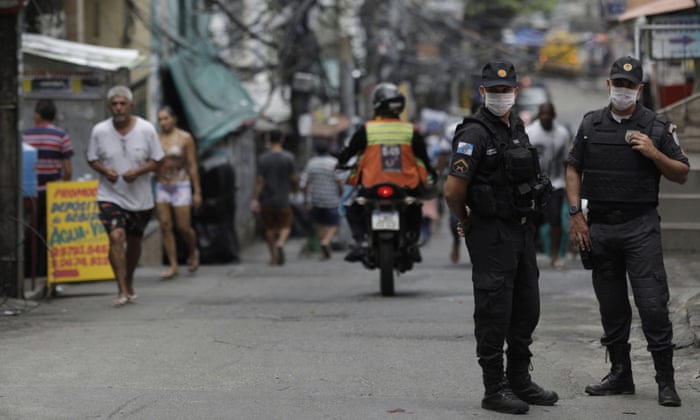Brazil "Much Ado About Nothing" COVID-19
"Undercounting empowers populists to say, 'See, things are not that bad."
"There is a huge effort by the federal government [of Brazil] to deny the gravity of the pandemic."
Pedro Doria, former executive editor, O Globo
"The big conclusion is that we don't know what the real scenario is."
"It gives the sensation that it is more controlled, when the reality is very different."
Leonardo Costa Ribeiro, economist, Federal University of Minas Gerais
"As a researcher, I look at the data and make analyses for the government."
"But as a citizen, I'm frustrated. The government is trying to control the epidemic without the elements of how to control it, because they don't know how serious it is."
"It will get much worse. There will be lines at the hospitals. There will be lines at the cemeteries."
"The next few weeks will be very dark."
Domingos Alves, data scientist, University of Sao Paulo
"Brazil could be thought of as a barometer of what could be expected in other countries."
"Information is paramount. The more we have, the more we can make the population aware of what it is exactly that we are facing."
Marcelo Gomes, researcher, Oswaldo Cruz Foundation
 |
| Brazilian President Jair Bolsonaro speaks to his supporters during a protest Sunday. |
In Brazil the problem of inadequate testing numbers in the battle against the global pandemic that the novel coronavirus out of China represents within the global community is almost totally absent. Not even the bare minimum is being done in Latin America's largest country, with a population of almost 210 million people, which has tested up to 40,000 cases, 12 times fewer than is being done in Iran, with its population of 82 million. Both countries have been hit hard by the SARS-CoV-2 virus causing COVID-19. Both deny the extent that the virus has penetrated their populations.
Patients that are hospitalized are not tested, and nor are some medical professions even while people are dying in their homes without having been tested. Brazil's President Jair Bolsonaro speaks of the pandemic as a 'fantasy' behind a 'a little flu'. The numbers, he declared earlier in the month "looked like the virus is starting to leave". Demonstrating in point of fact, that his is the 'fantasy' of the state of the epidemic in his country.
Brazil's health minister, Luis Henrique Mandetta, repeatedly, publicly contradicting the president on the crisis' severity, has been fired for his monumental audacity in undercutting the casual messaging of the president. And even as his supporters gather in city streets, repeating their president's calls for the economy to be reopened, data scientists warn the Brazilian epidemic of COVID is dramatically, dangerously more severe than they realize.
According to researchers at the Federal University of Minas Gerais, the country suffers eight times more cases of the coronavirus than official numbers admit to. A University of Sao Paulo research team is convinced the real number is 15 times greater than the official one, in other words up to 711,000 cases. Close to 37,300 people have been hospitalized this year if government statistics are to be believed, with respiratory ailments.
Half of that number of hospitalized patients have test results, while in Sao Paulo close to 1,300 people have died of unidentified respiratory problems in comparison to last year's 50 people. In Amazonas state's capital city so many people are being buried, representing three times the average rate, trenches are being dug for mass graves. At least it has that in common with Iran.
"We are not talking about testing the entire country. We are going to use the tests so that people tested will reflect the Brazilian population", said the new health minister, Nelson Teich who has declared increased testing the new pillar of the nation's pandemic response. To that purpose, the government has plans to buy 45 million tests, sufficient for a fifth of the population, though when the tests arrive or when they're intended for use remains a mystery. One can only hope they aren't arriving from China.
Brazil's laboratories, according to analysts, have been overwhelmed by a backlog of testing, they are not equipped to process tests at scale. And when it comes to competing on the international scrum for badly needed medical supplies and testing equipment, wealthier nations are winning that battle, able to pay out more or leverage advantageous ties with China. The country that gave the world COVID-19 now basks in popularity as a source for (faulty) medical supplies and equipment.
 |
| Police officers wearing protective masks patrol the Rocinha slum in Rio de Janeiro. Photograph: Ricardo Moraes/Reute |
"Sometimes they don't even wait for me to say my mother's name before hanging up."
"Nobody tells me what really happened to her. It was all very fast, and we just wanted an answer."
"It's inhumane."
Bruna Marques, 24, Sao Paulo state, grieving her mother's death
"One day, I saw on the news that in all of Sao Paulo there had been 20 burials of coronavirus victims."
"But I knew at my cemetery alone, there had been 27."
Manoel Norberto Pereira, gravedigger, Sao Paulo
Labels: Brazil, Deaths, NovelCoronavirus, President Jair Bolsonaro, Testing, Transmission

<< Home